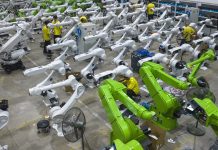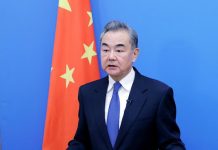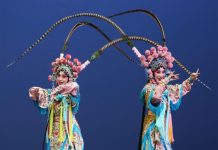In the classic Peking Opera San Cha Kou (or The Crossway), two male roles battle each other fiercely yet quietly in the night. The stage characters pretend to be shrouded in darkness, lunging at one another by listening, smelling and touching, but never seeing. To Chao Fan, an actor with the China National Peking Opera Co., this type of performance, one without an actual physical setup, is the charm and essence of Peking Opera.
A male role in Peking Opera is called sheng. There are xiaosheng (younger male roles), laosheng (older male roles) and wusheng (martial arts male roles). In 2005, 11-year-old Chao was sent off to study martial arts. After a one-year training, his coach recommended him to participate in the tryouts for actors of Peking Opera, and ever since, wusheng has become part of Chao’s life.
At the mere mention of Peking Opera, this traditional Chinese opera with a history of over 200 years, different things spring to different minds, ranging from face makeup, dramatic costumes or unique tunes. Yet, truthfully speaking, the word opera limits its definition.
Peking Opera is more than just another opera. It is a comprehensive performing art that rolls music, singing, dialogue, pantomime, acrobatics, and martial arts into one thespian aesthetic. At a deeper level, it mirrors the essence of traditional Chinese philosophy and values.
Mentioning Peking Opera, a similar image might float into most Chinese people’s minds, usually that of a grandpa with a cup of tea, enjoying the relaxed pace of life while listening to the rhythm of Peking Opera. However, traditional Chinese opera, including Peking Opera, is not only a thing for the elderly today. More and more young people are attracted by the charm of this traditional performing art, as they take increasing pride in traditional culture along with China’s development, and have a growing sense of responsibility to inherit this performing art.
Body of inheritance
“A desk is a desk when leaning on it and can also become a bed when lying on it. And when I wave a horsewhip, it means I am riding a horse,” Chao told Beijing Review. Peking Opera follows other traditional Chinese arts in emphasizing meaning, rather than accuracy. Therefore, its performers need to express emotions and plots through sophisticated body language. Moreover, the performance style requires audiences to use more of their own imagination based on the story background, lines, music, and the actors’ interpretations.
Peking Opera actors and actresses must meet more requirements than those active in other types of performing art. “The art of the ‘living body’ makes sense!” Shu Tong, Director of National Academy of Chinese Theatre Arts (NACTA) told Beijing Review, “Peking Opera is a culture that needs to develop and continue through people’s performances and the communication between performers and audiences.”
After graduating from NACTA in 2016, Chao officially began his career with the China National Peking Opera Co., where he started out as a supporting role.
“It is a growth process for all performers,” Chao said.
– The Daily Mail-Beijing Review News exchange item






